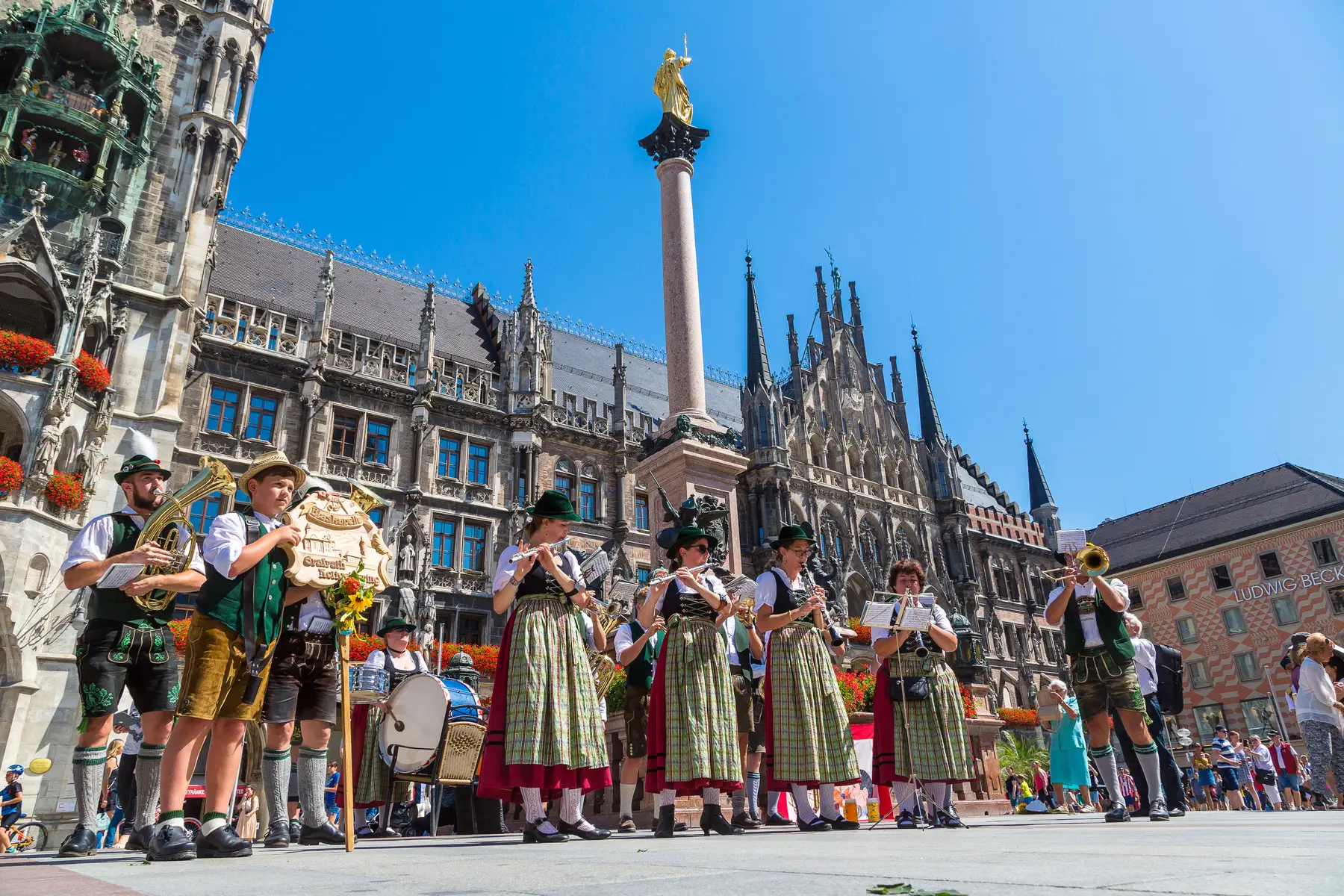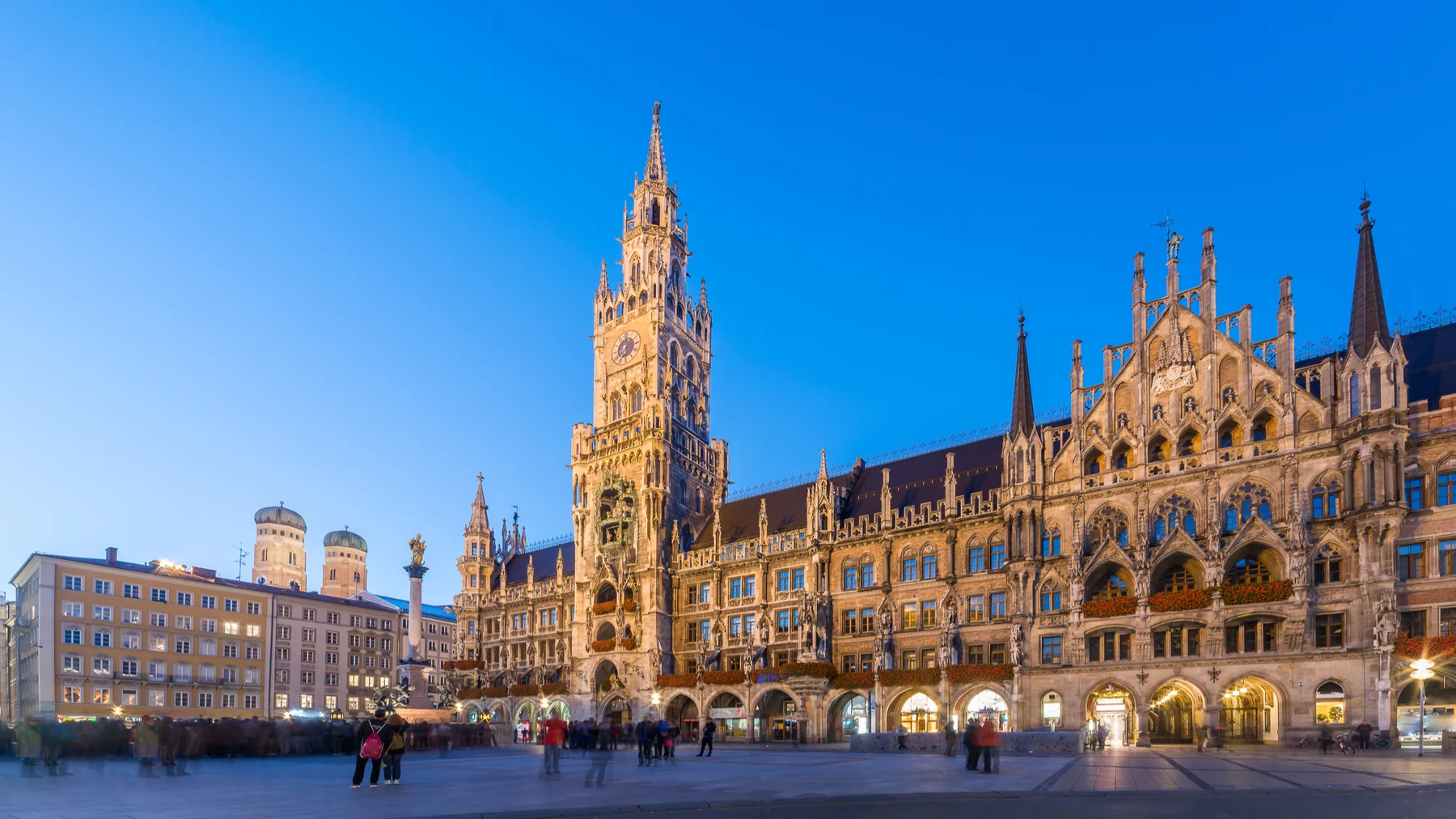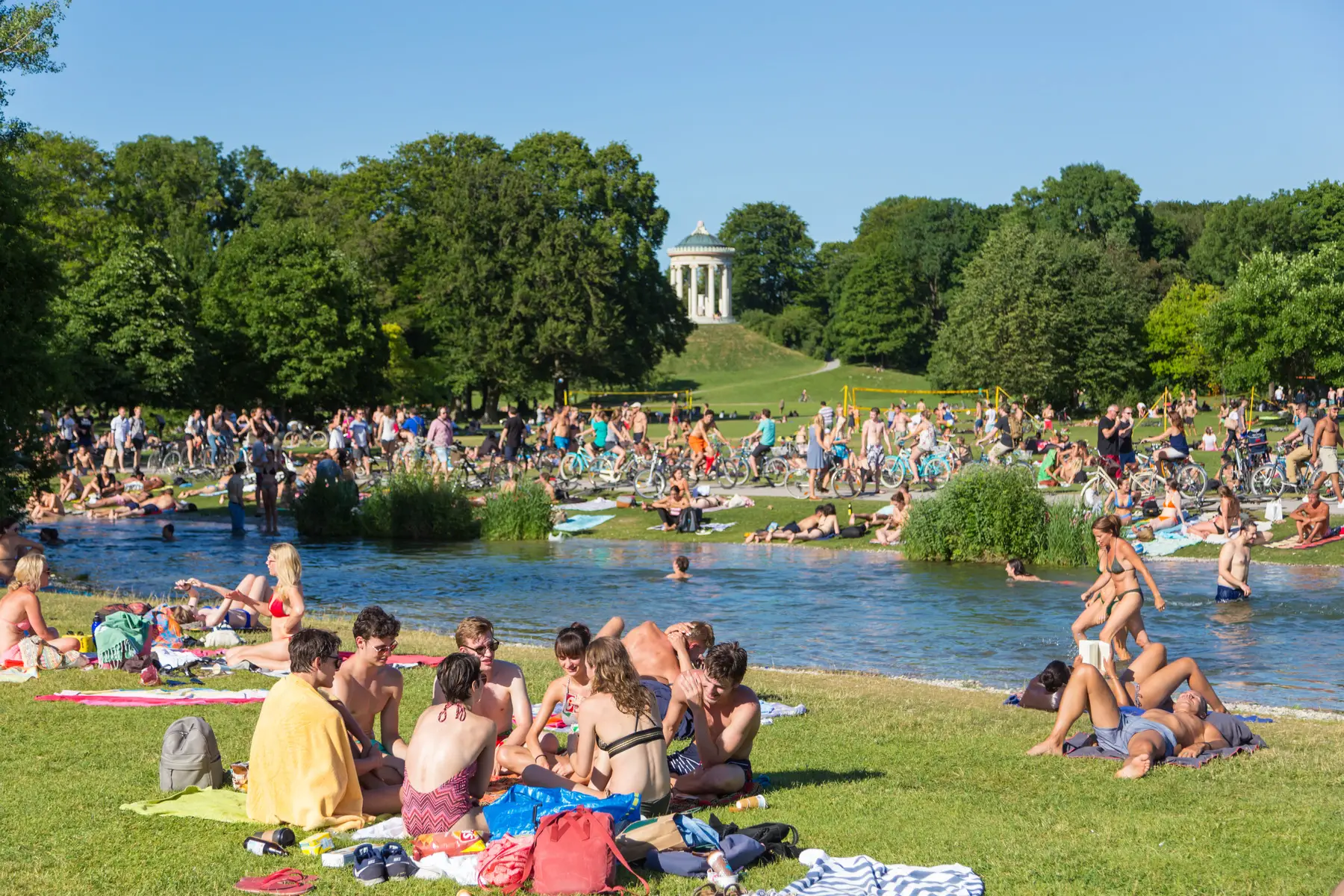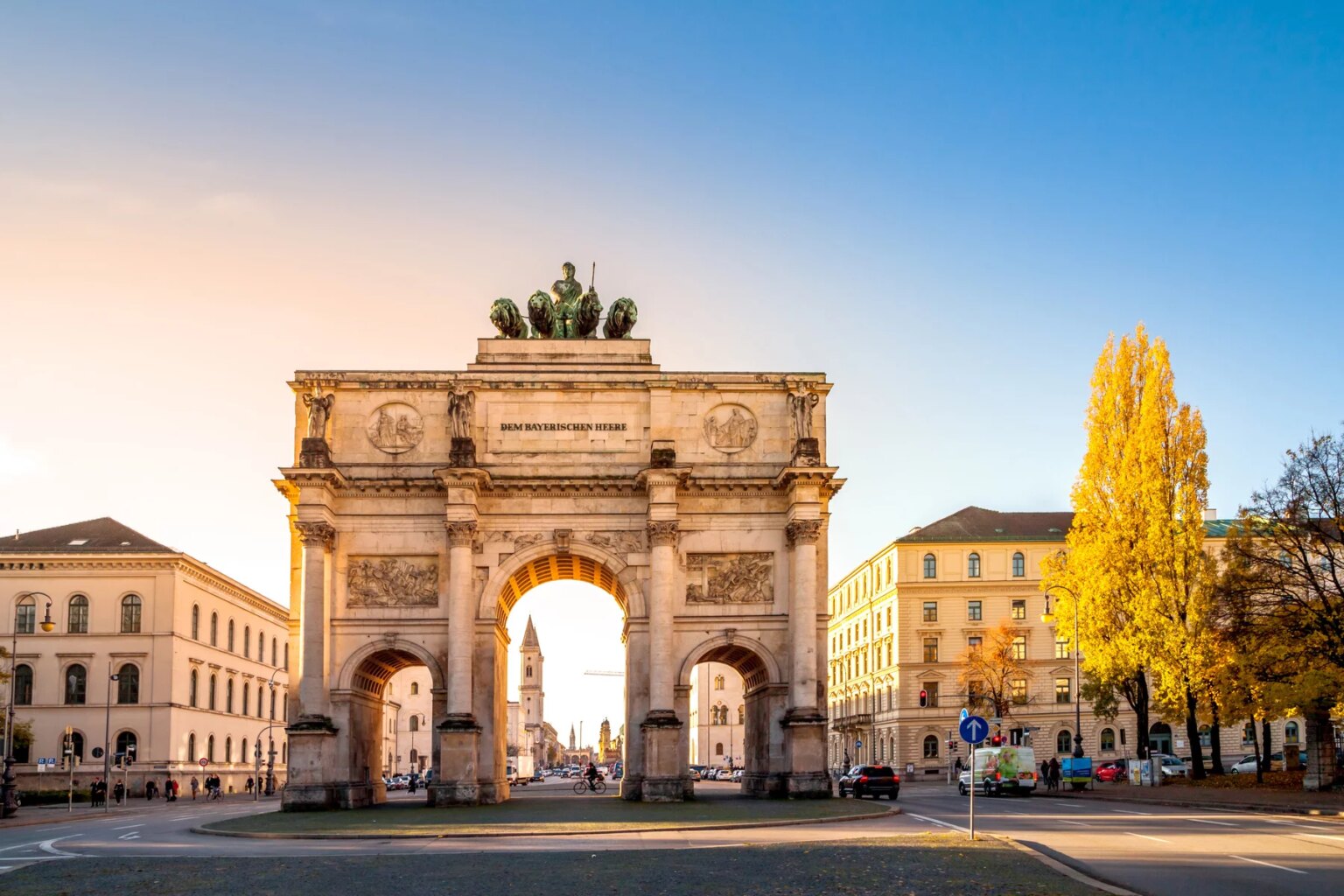Munich is a city of tradition, wealth, and of course beer. Occasionally it’s called the northernmost city of Italy. The first thoughts of Germany typically draw ideas of beer, pretzels, festivals, and lederhosen, although these things are most common to the state of Bavaria, where Munich is the capital.
Not only is Munich a great tourist destination, it’s also a popular place for expats from a wide array of industries. These include automotive, high-tech technology and electronics, film-making, as well as finance. It truly is a laptops and lederhosen economy.
This guide, sponsored by Bavarian International School, sets out everything you need to know about Munich, including the following sections:
- Where to live in Munich
- Find a rental in Munich
- Unfurnished rentals in Munich
- Furnished rentals in Munich
- Serviced apartments in Munich
- Short-term accommodation in Munich
- Student housing in Munich
- Lodging employees in Munich
- Social housing in Munich
- Tenants rights in Munich
- Where to find rental properties
- Where to arrange a residence permit
- Where to register
- Where to arrange a driving license
- Health and recreation opportunities
- Schools in Munich
- Munich’s golf courses
- Swimming in Munich
- Gyms in Munich
- Expat food in Munich
- English bookshops in Munich
Bavarian International School (BIS)
Looking for an international school in Bavaria? BIS is an English-language school with two campuses: in Haimhausen, Bavaria and Schwabing, Munich. Through its IB curriculum, the school aims to inspire and challenge young, curious minds from Kindergarten to Grade 12. Give your child the best start in life with Bavarian International School.
Where to live in Munich
Munich continues to be ranked as one Europe’s most expensive cities, although it’s also consistently ranked as having one of the best qualities of life in the entire world. The central location also allows for ease of travel and the airport recently placed in the top five worldwide.
Bavaria is home to the eight most expensive rural and urban municipalities in Germany, with Munich being over 100% more expensive than the national average. The average rent for a small one-bedroom, unfurnished apartment is between €500 and €700. For a three-bedroom unfurnished apartment the rent averages between €1,000 and €1,600.

It should also be noted that apartments are listed as ‘warm’ or ‘cold’ to denote whether utilities and heating are included or not. Oftentimes kitchens are not standard, so it may also be wise to budget for purchasing appliances and cabinetry.
Public transportation is widely used and accessible, so it helps to be close to an S-Bahn or U-Bahn line. Rents are highest in the inner city in areas with each neighborhood having its own devotees.
Some popular neighborhoods to live include spots such as:
- Schwabing – close to the universities and therefore popular with students and the young.
- Maxvorstadt -– centered around the art museums. It seamlessly melds into Schwabing with many small boutiques and restaurants.
- Isarvorstadt – popular for nightlife as well as the city’s gay quarter, including areas like the Glockenbachviertel.
- Haidhausen – a charming location on the Right Bank of the Isar with professionals, easy access to the river, and also many diverse restaurants.
- Lehel – posh and expensive with apartments and homes of athletes and the schicki-micki fashionable set.
- Bogenhausen – Luxurious centrally located villas and the city’s old money.
Find a rental in Munich
Germany has the second biggest rental market as a percentage of market share in the EU (after Switzerland) so there are plenty of places where you can look for accommodation, ranging from personal ads on noticeboards to online property portals. You can hire an estate agent (makler) to help you navigate the rental market in Munich. Please note that normally, there are no more commission fees for tenants in Germany.
Online property portals where you can find suitable rental accommodation in Munich include:
Other useful websites include:
It might also be worth keeping an eye on adverts in printed newspapers. These include:
- Abendzeitung (everyday)
- Kurz und Fundig (Tuesdays and Fridays)
- Münchner Merkur (has an online section on rentals)
- Süddeutsche Zeitung (Wednesdays and Fridays – also has an online portal)
Unfurnished rentals in Munich
Many properties are let without furnishings in Munich. These will be cheaper and are great if you want more freedom to bring in your own furnishings, but will obviously require a lot more work when it comes to moving in (and out!)
What are unfurnished rentals like in Munich?
Unfurnished flats in Munich are often let out completely unfurnished; that means no kitchen, no appliances, no nothing. These are typically available for long leases and are suitable for tenants looking to settle down and make the home their own. As Germany has a high percentage of renters, unfurnished properties are popular with families looking for stable long-term accommodation. All types of property can be found unfurnished, from one-bedroom apartments to 4-5 bedroom houses. Tenants will usually have the freedom to decorate and make some changes to fixtures and fittings, but check the tenancy agreement or ask the landlord first to find out what can and cannot be done. Partially furnished flats are also available to rent in Munich (e.g., kitchen appliances and fittings, but no beds or sofas).
Cost of unfurnished rentals in Munich
Average rental costs for unfurnished rentals in Munich are currently €17.56 per square meter, more expensive than other areas of Germany but cheaper than some parts of northern Europe. Expect to pay between €650-1,100 a month for a one-bedroom apartment in cheaper and suburban districts, and between €800-1,500 a month in the city center and more expensive parts of the city. The average for a 3-bedroom place is around €1,600 a month outside the center and €2,100 in the center, according to latest figures. Properties will be advertised as either “cold” (rental costs only) or “warm” (including some of the utility costs). Most properties in Munich are “cold”.
You can use this rent calculator to work out how much you should be paying when renting in Munich.
What to expect in an unfurnished rental contract
Typical rental agreements in Germany last for a minimum of two years. Landlords renting out unfurnished properties will probably be looking for long-term renters so expect to sign an agreement lasting at least a couple of years. Tenancies are usually unlimited so the contract is likely to be a rolling one that can be terminated by landlord or tenant with three months’ notice.
Check the contract carefully to see who is liable for repairs. Usually, tenants will be responsible for day-to-day repairs with the landlord having to take care of more extensive work such as repairs to the building. Subletting is normally possible. When moving out, you must return the property to the state it was in before you signed the lease. This will mean painting walls back to the original color (if you’ve decorated) and removing any fixtures and fittings installed unless you have permission from the landlord to leave them in place.
How to find an unfurnished rental in Munich
Unfurnished rentals can be found through real estate agents. You can find out information on agents in the Munich area through the German Real Estate Association. You can also find lettings through many of the online property portals such as:
To rent an unfurnished apartment in Munich, you will usually need to provide:
- photo ID and a German residence permit;
- proof of income;
- a credit report or a certificate from your previous landlord.
Furnished rentals in Munich
Furnished rentals in Munich have traditionally been associated with holiday lets and short to medium-term lets, but there are more places now offering longer leases on apartments that come fully furnished.
What are furnished rentals like in Munich?
Furnished rentals in Munich can vary from those that include standard furniture (beds, sofa, tables, kitchen utilities, etc.) to those featuring all mod cons (e.g., TV, Wi-Fi). Each agent or website should explain fully what is included within the rental costs. As with unfurnished properties, you can find furnished accommodation of all types and sizes.
Costs of furnished rentals in Munich
As would be expected, furnished properties tend to be more costly than unfurnished ones although not greatly so. One-bedroom apartments tend to range between €1,000-1,750 a month. Three-bedroom apartments can be from €1,800 to over €3,000. Houses start at around €1,600 for terraced properties, rising to over €4,000 a month for 4+ bedrooms. Properties can be rented “cold” or “warm” but are more likely to include utility costs within the rent than unfurnished rentals.
What to expect in a furnished rental contract
Tenancy agreements for furnished properties in Munich are largely similar to those for unfurnished rentals, although you will generally have less freedom to decorate or change fixtures and fittings. Most agreements will require you to get the property professionally cleaned before returning it upon leaving. Furnished accommodation tends to be more popular with those staying in Munich for a shorter period or those renting for the first time in the city before making the decision to rent longer-term or buy a German property.
How to find a furnished rental in Munich
Many of the online portals and real estate agents advertising accommodation in Munich include a range of furnished rentals. The process for renting and documentation needed is the same as that for unfurnished accommodation. Websites where you can find furnished properties include:
Serviced apartments in Munich
Serviced apartments are fully furnished apartments that provide additional services such as room service, housekeeping, and on-site amenities, similar to hotel services. They are popular with short-term visitors and professionals.
What are serviced apartments like in Munich?
You can find a range of fully serviced and luxury apartments offered through various companies in Munich, with some also offering fully serviced houses. These can be provided within separate residential complexes or luxury hotels. You can usually choose the level of service you require, with available services including cleaning, laundry, breakfast, and room service.
Cost of serviced apartments in Munich
Serviced apartments usually charge by the night, similar to hotels, although renting in Munich for longer periods is often possible and it will work out cheaper in the long run. Prices are generally all-inclusive and can range from between €50 and €200 per night, with additional services often costing extra.
What to expect in a serviced apartment rental contract
With serviced apartments, you are more likely to have to sign a terms & conditions agreement rather than a full tenancy agreement, similar to what you have to sign with hotels. Some companies will have a longer contract and will ask for a deposit to cover damages, particularly for longer stays. You will normally specify the length of time you want to stay upfront and will be able to extend the duration depending on availability. Most contracts or agreements will require that tenants make no changes to property appearance or fittings.
How to find serviced apartments in Munich
Companies providing serviced accommodation in Munich include:
Short-term accommodation in Munich
Short-term lets, ranging from a few weeks to a year, are often favored by expats new to Munich. These are a convenient (and usually cheaper) alternative to hotels.
What is short-term accommodation like in Munich?
As it is a popular tourist city that hosts many international events, such as Oktoberfest, Munich has plenty of short-term accommodation options including small apartments, large houses, holiday lets, and serviced apartments. Properties usually include mod cons such as TV and wifi.
Cost of short-term accommodation in Munich
Short-term lets are typically more expensive than longer lets but will vary according to factors such as area and accommodation type. Good deals are available if you shop around. Both “cold” and “warm” lets are possible, with many places including utilities in the advertised rent.
What to expect in a short-term accommodation rental contract
Although tenancy agreements will be shorter fixed-term contracts, the three-month notice period often still applies and tenants moving into a place on a short 3-month let will be expected to stay for the duration or risk losing their deposit. Other than this, agreements for short-term lets do not differ much from standard tenancy contracts.
How to find short-term accommodation in Munich
Websites advertising short-term rentals in Munich include:
Student housing in Munich
With 13 universities and around 120,000 students, Munich has plenty of student accommodation with options including university halls of residence and private rented accommodation.
What is student housing like in Munich?
There is a vast range of student accommodation in Munich. It’s not always easy for students to find affordable accommodation. The Student Union offers around 11,000 rooms and apartments in halls of residence at three locations. Only around 13% of students in Munich live in dorms, with the rest opting for private rooms, apartments, or flatshares.
Cost of student accommodation in Munich
Costs for accommodation within student halls of residence in Munich vary depending on type, with the average cost of a single dorm being around €290 a month. All costs are included although parking is extra if required, charged at between €6-30 a month for students. The average cost for students living in private accommodation in Munich is between €400-650 a month including bills, depending on location.
What to expect in a student rental contract in Munich
Student tenancy agreements in Munich are largely the same as general tenancy contracts in terms of deposit, notice periods, rights and responsibilities. There is usually no sub-letting clause.
How to find student rentals in Munich
Studentwerk Muenchen, the student union in the city, operates the student dorms within halls of residence in Munich. Waiting times are between 1–5 semesters so it’s advisable to apply early. You can submit an online application. The student union can also help students find suitable private accommodation once they leave halls of residence or if they’ve been unsuccessful with their application. Other sites that advertise private student-rented accommodation in Munich are:
Lodging employees in Munich
Many companies based in Munich bring in workers from overseas who need a place to live in the city, sometimes short-term and sometimes long-term. Mr. Lodge works closely with companies in Germany to find suitable short-term housing for employees and their families. The staff at Mr. Lodge work closely with individual employers to ensure that newly relocated workers settle into life in Munich quickly and feel at home.
Social housing in Munich
Social housing is not common in Germany and property is mostly available to rent through the private sector. Instead, there is discounted state-subsidized housing which constitutes around 5% of housing in Germany. Subsidized housing can be found through housing companies (wohnungsunternehmen), housing associations (wohnungsgesellschaften) or co-operatives (wohnungbaugenossenschaft). Housing stock is managed in Germany at municipal level and many cities, including Munich, have committed to providing more subsidized homes for low-income residents by 2021.
Social housing is available in Munich to those on low incomes as well as groups such as single parents, elderly residents and pregnant women. Low earners can also claim housing allowance in the form of a rent subsidy (wohngeld) to meet rental costs. To apply for social housing, housing benefit or find out more information, you can contact the social services department at the Munich city hall.
Tenants rights in Munich
Housing law in Germany is broadly in favor of the tenant and protects them against things such as eviction without warning and excessive rent increases. You can read more about tenant rights in this guide to renting in Germany.
Where to find rental properties
While there is a seemingly endless supply of sources of information on accommodation, the Süddeutsche Zeitung and the Münchner Merkur are good starting points for exploring the city’s rental market. Mr. Lodge is a furnished apartment provider with a multilingual team especially helpful for expats moving to Munich.
Where to arrange a residence permit
For those living in central Munich
Landeshauptstadt München
Kreisverwaltungsreferat (KVR)
Hauptabteilung II, Einwohnerwesen
Ausländerangelegenheiten
Ruppertstr. 19, 80337 München
Tel: (089) 233 23087 23131
General opening times:
Monday: 07:30–12:00
Tuesday: 10:00–12:00 and 14:00–18.30
Wednesday: 07:30–12:00
Thursday: 10:00–16:00
Friday: 07:30–12:00
For those living in the suburbs
Landratsamt
Mariahilfplatz 17, 81541 Munich
089 62210

General opening times:
Monday to Friday: 08:00–12:00
Thursday: 08:00–12:00 and 14:00–17:30
Where to register
Landeshauptstadt Munich
Kreisverwaltungsreferat
Einwohnermeldewesen KVR HA II/2
Ruppertstr. 19, 80313 München
Tel: (089) 233-23154 -23155
General opening times:
Monday: 07:30–12:00
Tuesday: 10:00–12:00 and 14:00–18:30
Wednesday: 07:30–12:00
Thursday: 10:00–16:00
Friday: 07:30–12:00
Where to arrange a driving license
Kreisverwaltungsreferat
Kraftfahrzeugzulassung und Fahrerlaubnisbehörde
Eichstätter Str. 2, 80686 München
(089) 233 96090
General opening times
Monday to Friday: 07:00–12:00
Tuesday: 14:30–16:30
[email protected]
Health and recreation opportunities
Munich has a vast array of sports, regardless of the season, for both spectators and those that would like to be active themselves.
In addition to local teams, there is also an extensive network of vereine (associations) or clubs for virtually every imaginable sport. For starters you could consult this list of sport and fitness clubs.
Schools in Munich
As with any big city, Munich has plenty of educational options on offer. Some expat families will choose the local state school, while others will instead opt for international schools. These schools can offer a more internationally-focused curriculum and provide education in English and other foreign languages.
For even more information on choosing the right option for your child, read our guide to choosing a school in Germany.
Munich’s golf courses
Anyone interested in golf will find themselves well served by Munich and its surroundings with more than 40 clubs in an around the Bavarian capital. This includes the Munchener Golf Club (08170 450), Margarethenhof Am Tegernsee Golf Club (08022 7506-0) Munchen-Riedhof Golf Club (08171 7065) and Tegernseer G C Bad Wiessee (08022 8769).
It’s important to note that golfing in Germany requires a special licence, which may require additional certification.
Swimming in Munich
For those looking to take a dip or to swim for more regular exercise, there are about 17 public swimming pools dotted across Munich. The biggest is Olympia-Schwimmhalle at the Olympiapark. It costs €3.90 and €3 for students for three hours or a day pass can be purchased for €7 and €5 for students. A family day ticket can be purchased for those with children 13 and younger for €14.80.

If you are interested in swimming against a rather dramatic backdrop then you should try Müllersches Volksbad (Müller’s Public Baths), Rosenheimer Strasse 1. Completely renovated, the baths were designed in the early 1900s. Admission is €3.80 and €3 for students. It should also be noted that they have a wonderful sauna.
For a map showing your closest pool visit: www.swm.de.
There are also several popular swimming areas in lakes and rivers in Munich including in the Isar River, which cuts through Munich. For those wanting to swim in lakes there are Feringasee, Fasaneriesee, Feldmochinger See and Lerchenauer See. Apart from taking a dip they also provide great opportunities for picnicking, sunbathing and just hanging out.
Gyms in Munich
The people of Munich are rather fit, despite the carb-heavy cuisine and litres of beer. At last count there were more than 90 major gyms spread across the city which means competition among gym operators can be tough. That of course is good news for anyone wanting a membership. The name of the fitness game is negotiation as many gyms will be prepared to do all sorts of deals.
Many of the gyms are parts of chains and offer different services with some of their premises more spacious than others and including extras. When signing up you should ask whether membership entitles you to entry to the company’s other gyms which are often also in other cities.
Some of the most popular gyms in Munich are:
- Body Up Diva Hauptbahnhof (Women), (089) 55 02 222
- CBC Colosseum Body Care, (089) 550 549 0
- Kieser Training, (089) 76 70 20 20
- My Sport Lady Fitness & Wellness, (089) 201 42 48
Expat food in Munich
Germany is slowly making progress with its supermarkets stocking a selection of products from all around the world as well as independent stores stocking a range of products from various countries. However, if you’re not able to find certain products it may be worth looking at a specialty store. Here is a small list of stores throughout the city.
American
Karstadt at Hauptbahnhof
Bahnhofplatz 7, 80335 Munich
(089) 55 120
Asian
Orient Shop
Rosenheimer Str. 34, 81669 Munich
(089) 448 52 51
British
British All Sorts
Rosenheimerstr. 161, 81671 Munich
(089) 23 54 92 75
Pomeroy & Winterbottom
Reichenbachstr. 38, 80469 Munich
(089) 20 16 901
Indian
Kohinoor
Adolf Kolpingstr 10, 80336 Munich.
(089) 55 45 22
Mediterranean
Mitte Meer
Friedenstr. 12 , 81671 Munich
(089) 67 80 59 90
Mexican
Mercado de México
Schulstraße 38, 80634 Munich
Turkish
Verdi Supermarket
Landwehrstr. 46, 80336 München
(089) 53 54 87
English bookshops in Munich
Hugendubel
Marienplatz, Fünf Höfe, Karlsplatz, Salvatorplatz
Words’ Worth Books
Schellingstr 21
The Munich Readery
Augustinstr 104
Geobuch
Rosental 6
Internationale Presse
Hauptbahnhof



